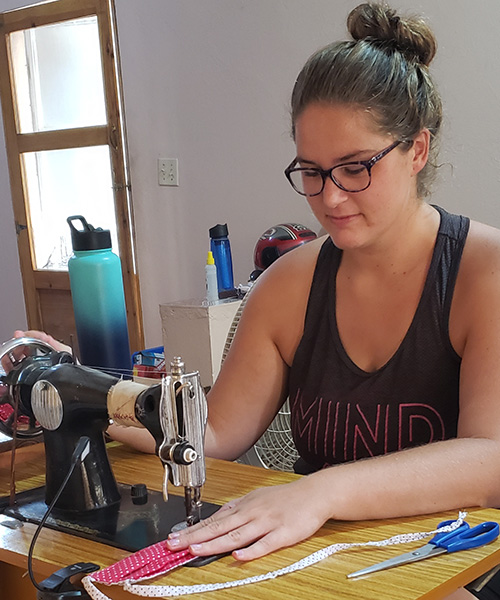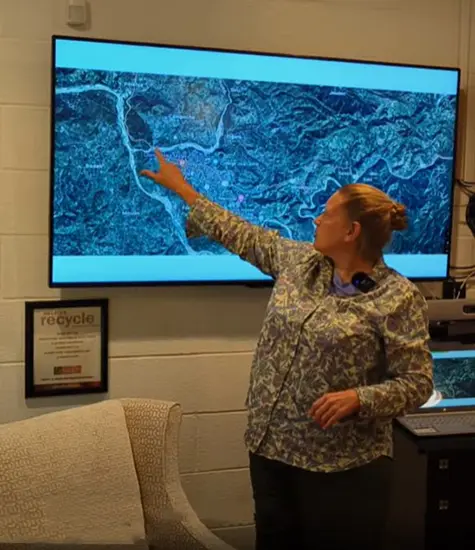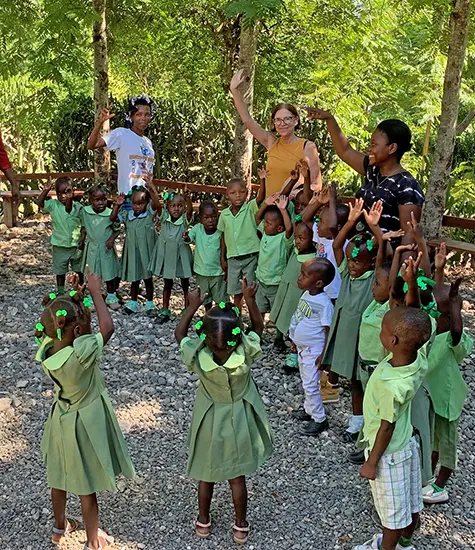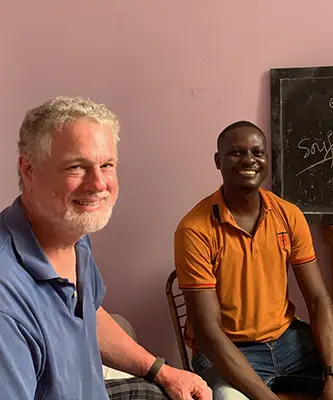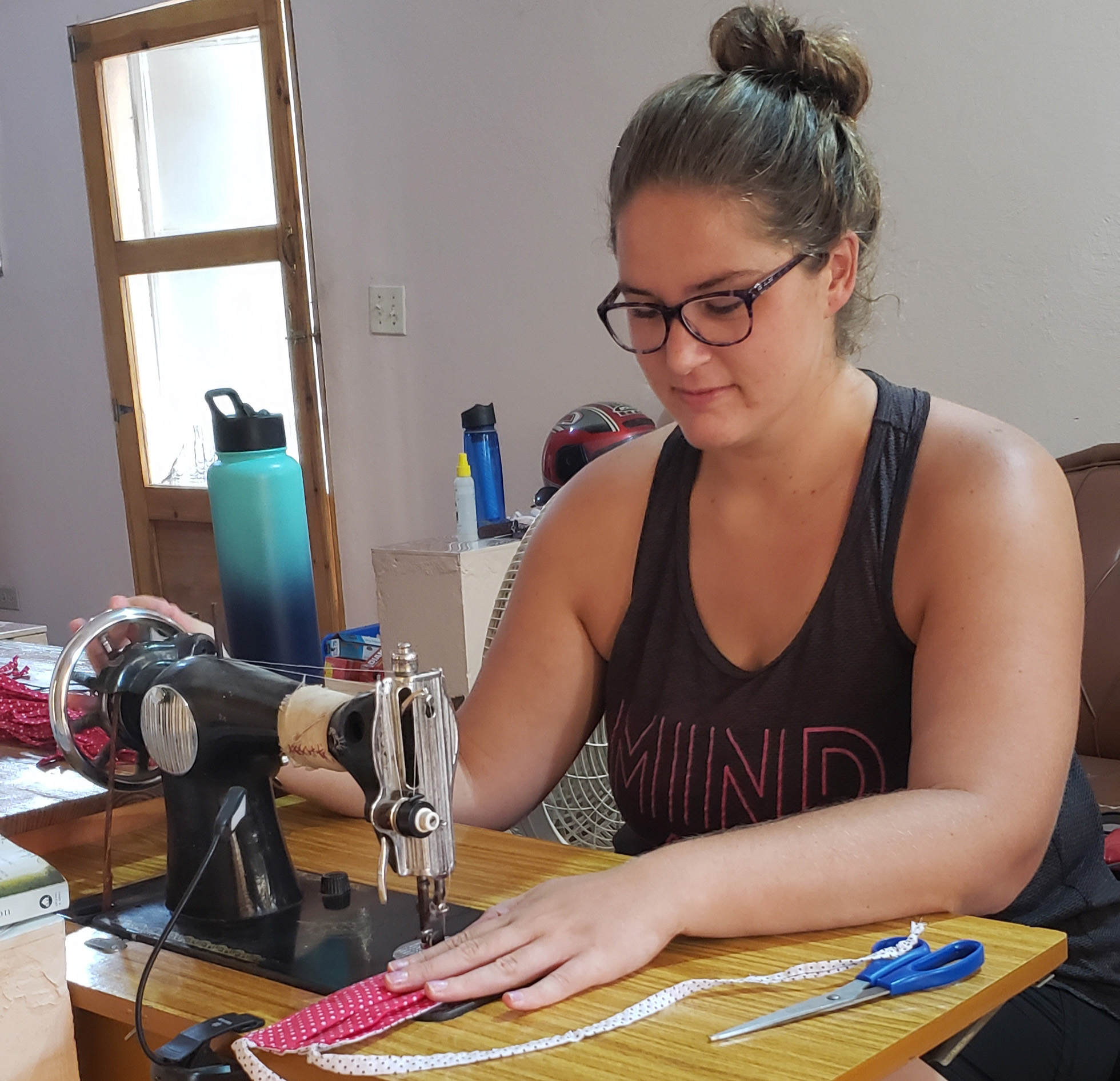
Abby Belt sewing protective masks for community groups in Gros Morne, Haiti
Despite rapidly growing numbers of cases of COVID-19 and deaths in Haiti, many people still refuse to believe the virus is here. Yet those of us who know it is here, and has been for months, strive to be examples of love and caution even as we fear that the extent of the pandemic is being drastically underreported.
When the initial outbreak was confirmed in mid-March, some Haitian citizens tried to attack those who tested positive. One radio DJ declared the government was lying to the people and the virus was made up. In response, several of the sanitization stations for hand-washing that had been set up by health organizations were burned in giant piles.
Even as the number of cases rose — about 8,000 and nearly 200 deaths reported as of mid August — the number of people seen wearing masks here seemed to decrease. The general attitude seemed to be “I’m over it” and a majority of people were not taking the pandemic seriously, if they believed it at all.
Yet for the three of us serving here as Maryknoll lay missioners, and the colleagues we work with, our decision to stay is about accompanying the people and doing what we can, even if that is just setting an example. When we go out on the street, we wear our masks.
In deciding to stay in Haiti as the pandemic approached and then arrived, we figured we could either ride out the coronavirus crisis here and be able to respond first when we do get to the other side of this, or we could scramble and try to get home and ride it out there, with no known guarantee of when we’d get to return to our beloved Haiti. For me, even carefully considered, the choice was not too hard.
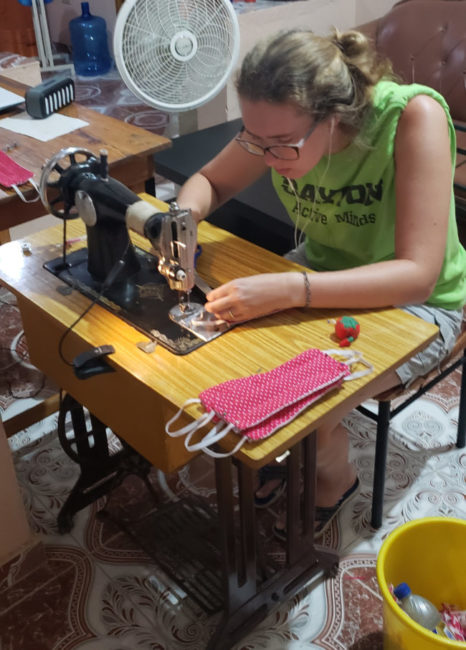
Jill Foster joins in the mask making.
Sewing masks
In the community of Gros Morne, where we live, we are working to educate the public and have taken steps to enable people to protect themselves. Jill Foster, our newest Maryknoller in Haiti, and I have been making masks for various community groups, thanks to the generous backing of Mercy Beyond Borders, one of my regular ministry sites when schools are in operation.
Normally, my main ministry is providing continuing education to teachers at Jesus-Mary School in Gros Morne and assisting with a scholarship and empowerment program for young women at Mercy Beyond Borders, a non-profit that works with marginalized women and girls.
When schools shut down on March 20, my focus shifted to helping in the morning at an agronomy center known as Grepen, a joint project of the Montfort missionary priests and the sisters of the Religious of Jesus and Mary, and making masks in the afternoon.
Jill came out of two months of language school and was here for a week when everything shut down. She has shown tremendous spirit and patience as we navigate life in this time, especially considering she has not gotten to explore her ministry options.
Sami Scott, a 24-year veteran lay missioner, continues to work at the hen house project near Grepen, which provides income for local women, a market for local corn producers, and fresh eggs for the women to resell in town or use in their shops.
Nowadays, we try to avoid the market, which is usually overcrowded. We wear masks to work every day and keep our distance from others as much as possible. Our days are rather repetitive, but I believe we’re blessed to be able to continue working outdoors during this time.
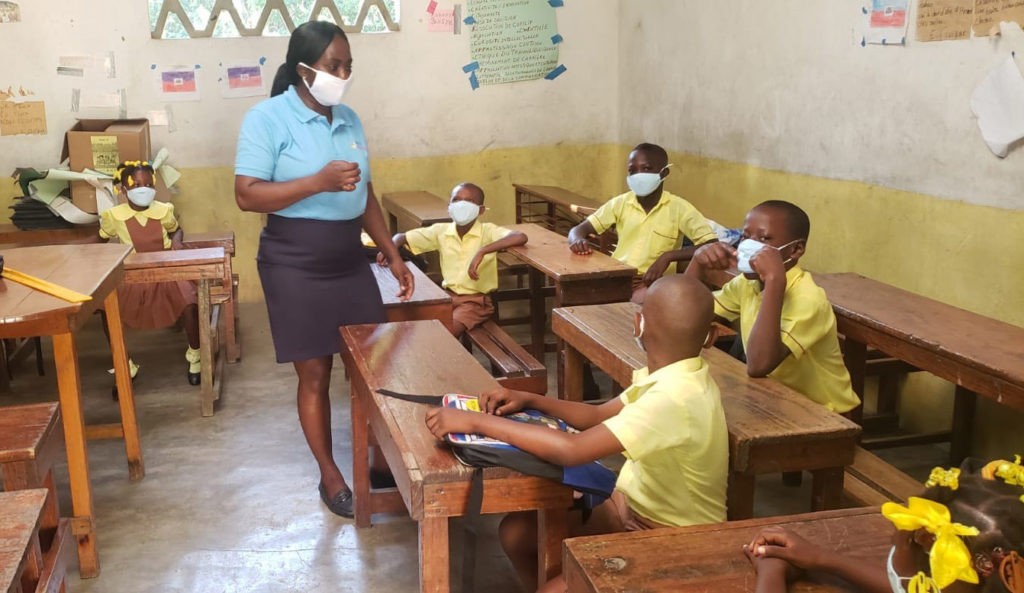
Jesus and Mary School in Gros Morne reopened Aug. 17.
The state of emergency ended July 20, and schools reopened, with restrictions, in August. It’s difficult for many schools as the number of students is overwhelming when trying to respect the distancing requirements. For example, at Jesus-Mary School before the pandemic, we had more than 50 students in one first grade classroom, so to alleviate the confined space, we are breaking the class up and putting some students in the preschool rooms when preschool is not in session.
With still-crowded classrooms, physical-distancing remains a challenge, so we keep emphasizing the importance of mask wearing and hand washing, and we give them many opportunities during the day to wash their hands.
Teachers here are as stressed as teachers in the United States about going back to in-class learning, but we cannot do much online learning here or offer a hybrid of online and in-person teaching. As a Maryknoll colleague put it, “Be kind to your teachers; they are building their planes as they are driving them.”
Mercy Beyond Borders continues to operate, with the guidelines of mask and sanitization in place to help protect our scholars.
Widespread hardship
The reality is that Haitians are essentially on their own because of the lack of resources to deal with the pandemic. Many Haitian families are facing extreme hardship because of the significant decrease in remittances, that is, money sent home from Haitians living and working abroad. The decrease is due to the global economic decline combined with job losses in the United States, which has the largest number of Haitians outside of the country.
Like so many of the world’s poor and marginalized, many Haitian families rely on the informal economy and live day to day. Under the stay-at-home order, they were asked to choose between going out and working to make money for food and risk exposure or staying inside and dying from starvation with their children.
Meanwhile, we are in place, doing what we can. Despite all of the uncertainty, fear and overwhelming moments of powerlessness to truly effect change, hope anchors us.
That hope is in the voice of the local people who are rallying to educate their peers about this virus. It is in the doctors and nurses prepping to do their jobs even knowing they will likely be overwhelmed with patients. It is in people donating to help purchase the equipment for hand-washing stations, neighbors continuing to look out for one another, and little moments of kindness shared with people we pass on the street.
Haitian friends continue checking on us every day to ask if our families are still OK and if we ourselves are well. Generosity here is as endless as the dust and humidity.
So when I make masks, I find joy and sew with love. Every stitch is a smile, just as a friendly call, a kind word, or a simple yet profound little prayer helps us all weave together our story. I hope our tapestry in this time continues to show our strength, resilience, humor, and, above all, our great capacity for love.
Alongside our Haitian neighbors, we continue to try choosing love in simple ways and weave this beautiful, complex story of us.
Adapted from a story that appears in the September-October issue of Maryknoll magazine. Photos courtesy of Abby Belt.

